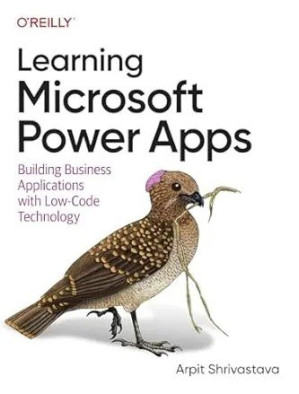English [en], .epub, 🚀/zlib, 74.4MB, 📗 Book (unknown)
Learning Microsoft Power Apps: Building Business Applications with Low-Code Technology 🔍
O'Reilly Media, Incorporated, 1, PT, 2024
Arpit Shrivastava 🔍
description
In today's fast-paced world, more and more organizations require rapid application development with reduced development costs and increased productivity. This practical guide shows application developers how to use PowerApps, Microsoft's no-code/low-code application framework that helps developers speed up development, modernize business processes, and solve tough challenges. Author Arpit Shrivastava provides a comprehensive overview of designing and building cost-effective applications with Microsoft Power Apps. You'll learn fundamental concepts behind low-code and no-code development, how to build applications using pre-built and blank templates, how to design an app using Copilot AI and drag and drop PowerPoint-like controls, use Excel-like expressions to write business logic for an app, and integrate apps with external data sources. With this book, you'll: Learn the importance of no-code/low-code application development Design mobile/tablet (canvas apps) applications using pre-built and blank templates Design web applications (model-driven apps) using low-code, no-code, and pro-code components Integrate PowerApps with external applications Learn basic coding concepts like JavaScript, Power Fx, and C# Apply best practices to customize Dynamics 365 CE applications Dive into Azure DevOps and ALM concepts to automate application deployment Citizen developers and professional application developers alike will be able to design robust applications and solve real world business challenges using Power Apps. Arpit Shrivastava is a Microsoft MVP and Power Platform architect at Capgemini, with vast experience working with Microsoft Dynamics 365 and the Power Platform.
Alternative publisher
Oreilly & Associates Inc
Alternative edition
United States, United States of America
date open sourced
2024-07-18
🚀 Fast downloads
Become a member to support the long-term preservation of books, papers, and more. To show our gratitude for your support, you get fast downloads. ❤️
- Option #1: Fast Partner Server #1 (recommended) (open in viewer) (no redirect) (no browser verification or waitlists)
- Option #2: Fast Partner Server #2 (open in viewer) (no redirect)
- Option #3: Fast Partner Server #3 (open in viewer) (no redirect)
- Option #4: Fast Partner Server #4 (open in viewer) (no redirect)
- Option #5: Fast Partner Server #5 (open in viewer) (no redirect)
- Option #6: Fast Partner Server #6 (open in viewer) (no redirect)
🐢 Slow downloads
From trusted partners. More information in the FAQ. (might require browser verification — unlimited downloads!)
- Option #1: Slow Partner Server #1 (slightly faster but with waitlist)
- Option #2: Slow Partner Server #2 (slightly faster but with waitlist)
- Option #3: Slow Partner Server #3 (no waitlist, but can be very slow)
- After downloading: Open in our viewer
External downloads
All download options have the same file, and should be safe to use. That said, always be cautious when downloading files from the internet, especially from sites external to Anna’s Archive. For example, be sure to keep your devices updated.
-
For large files, we recommend using a download manager to prevent interruptions.
Recommended download managers: JDownloader -
You will need an ebook or PDF reader to open the file, depending on the file format.
Recommended ebook readers: Anna’s Archive online viewer, ReadEra, and Calibre -
Use online tools to convert between formats.
Recommended conversion tools: CloudConvert -
You can send both PDF and EPUB files to your Kindle or Kobo eReader.
Recommended tools: Amazon‘s “Send to Kindle” and djazz‘s “Send to Kobo/Kindle” -
Support authors and libraries
✍️ If you like this and can afford it, consider buying the original, or supporting the authors directly.
📚 If this is available at your local library, consider borrowing it for free there.
Total downloads:
A “file MD5” is a hash that gets computed from the file contents, and is reasonably unique based on that content. All shadow libraries that we have indexed on here primarily use MD5s to identify files.
A file might appear in multiple shadow libraries. For information about the various datasets that we have compiled, see the Datasets page.
For information about this particular file, check out its JSON file. Live/debug JSON version. Live/debug page.
